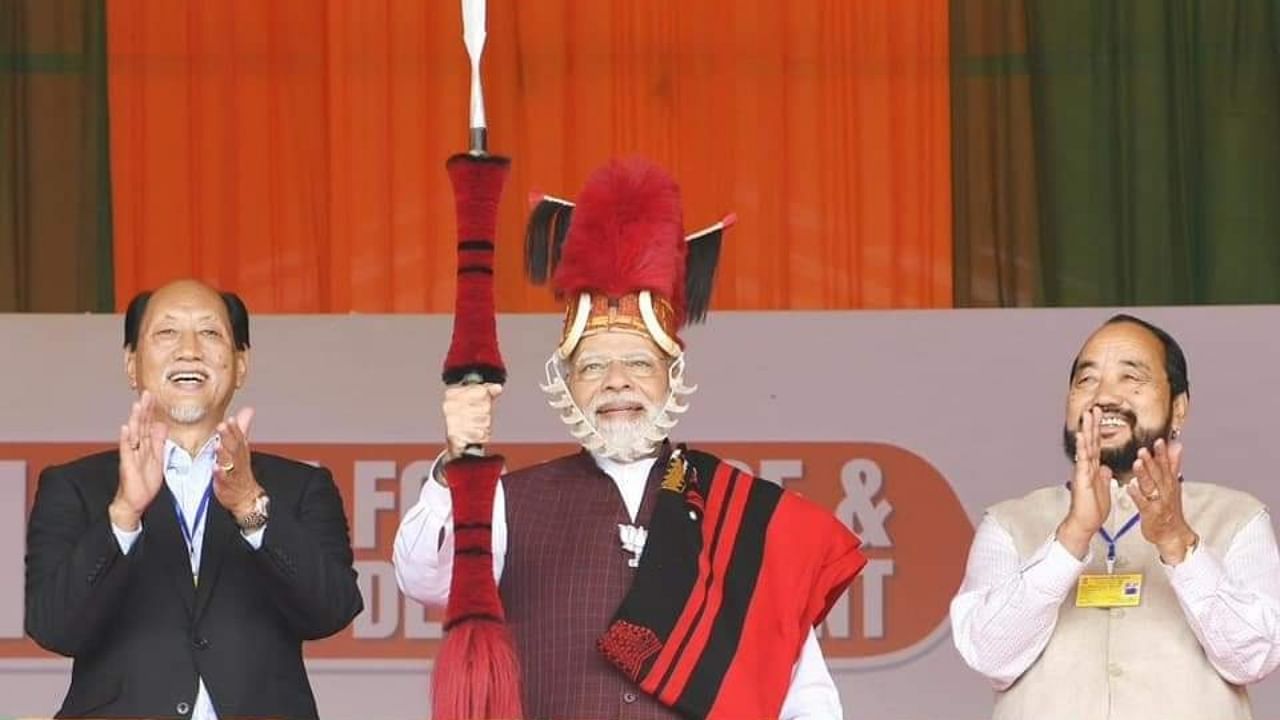
"I eat beef, it's a lifestyle for us...no one in the party objects to this...." Earnest Mawrie, president of BJP's Meghalaya unit has repeatedly said as the Christian-majority state heads for Assembly elections on February 27.
BJP was almost non-existent in Meghalaya till the 2018 Assembly elections, when it bagged two seats in the 60-member Assembly. It subsequently became a minor partner in the Meghalaya Democratic Alliance (MDA) government led by the National People's Party (NPP). BJP, however, quit the MDA government just before the polls with a bigger target of forming its own government and fielded candidates in all 60 seats.
The party is not only levelling charges of corruption against its former ally, NPP and rival Congress, but is aggressively pushing the narrative that BJP is not against the Christians, nor against their culture, tradition and food habits (particularly beef).
"We have provided piped water to six lakh households in Meghalaya, provided 75,000 pucca houses and free ration to 20 lakh people. We did not look at their religion or caste," Prime Minister Narendra Modi said while addressing a rally at Tura in Garo Hills on Friday. "When 50 Christian nurses from Kerala got stuck in the war in Iraq, we did not look at their religion and airlifted them back into India. When Father Alex Prem Kumar was abducted by the Taliban, we rescued him. So BJP is not a party that discriminates based on religion, caste or creed," Modi said. "We are setting up more Ekalavya schools for the tribals, constructing 4G telecom towers for remote tribal areas.." he said.
Mawrie, a businessman belonging to the Khasi community in Meghalaya, who joined BJP in 2020 has been vocal against the NPP. He claimed that BJP's vote share this time will increase to 20 to 25 per cent against 9 per cent in 2018. Bernard N Marak, a former militant-turned-politician, on the other hand, has been fielded as BJP's candidate against CM and NPP president Conrad K Sangma in the South Tura Assembly constituency. The 47-year-old Marak, belonging to the Garo community had joined BJP in 2014 after laying down arms as a militant leader. He, however, quit the party in 2017 following a notification by the Centre that sought to restrict the sale of cattle for slaughter. Marak, however, rejoined BJP in 2019. He was arrested in July last year on a charge of running a brothel in his farmhouse. Marak was later granted bail.
Nagaland formula:
In Nagaland, another Christian-majority state going for polls on February 27, BJP has retained its pre-poll alliance with Nationalist Democratic Progressive Party (NDPP), a regional party led by CM and veteran politician Neiphiu Rio. The NDPP was formed in 2017 with the aim to find a solution to the decades-old Naga conflict. As BJP and NDPP made "elections for solution" their slogan in the 2018 Assembly elections, BJP's tally in the 60-member Assembly increased to 12, from just five in the 2013 polls. BJP, this time, has already named Rio as the CM candidate while Deputy CM Y Patton and the party's state unit president, Temjen Imna Along are leading BJP's baton in this election.
Although a final solution to the Naga conflict has still remained a promise, BJP leaders are claiming that they took Nagaland to the path of peace and progress in the past five years. PM Narendra Modi said due to efforts in the past five years, Nagaland witnessed a 75 per cent reduction in insurgency-related incidents while the AFSPA was lifted from areas under 15 police stations in seven districts. "We hope that the AFSPA will be lifted from the entire Nagaland in the next three to four years," Home Minister Amit Shah said at a rally in Tuensang in Eastern Nagaland on February 21. Eastern Nagaland witnessed a strong agitation for the withdrawal of the AFSPA following the killing of 14 civilians by the army in December 2021 in the Mon district.
Shah said after the elections, the MHA will sign a pact with Eastern Nagaland People's Organisation that issued a call to boycott the polls and demanded a separate state. BJP's manifesto also promised a development board and a special package for Eastern Nagaland.
The saffron party, at the same time, has kept promising many schemes for the protection and promotion of Naga culture, language and tradition, well aware of the possible backlash from the churches to the saffron party's expansion plans. In fact, Shah had met church leaders in Nagaland during his first visit in preparation for the Assembly elections, in January. Nine out of 10 people in Nagaland are Christians and the church bodies play a key role in elections in the Northeastern state. As the BJP manifesto promised a special fund for the protection and promotion of Naga culture and traditions, several church bodies recently urged the people to "vote wisely" to decide the future of the Nagas and their unique identity.
"We stand for peace, progress and prosperity of Nagaland. So the faith of the Nagas towards BJP and NDPP is increasing. Many youths are leaving the path of violence and joining our journey of development," PM Modi said on Friday at Chumukedima near Dimapur, a commercial town.
Vikas Tripathi, who teaches political science at Gauhati University told DH that BJP was taking the route of "defection and alliance" in order to make its footprint gradually strong in the Christian-dominated states. "They are taking the influential community leaders on board, who play the most important role in carrying out the outreach programmes for BJP. Earnest Mawrie and Bernard N Marak are doing so in Meghalaya and Y Patton and Temjen Along are doing the same in Nagaland." "Initially BJP ties up with the regional parties and then gradually goes ahead to strengthen its footprints. In Nagaland, BJP will remain an important partner in the government while in Meghalaya too, BJP is unlikely to quit the relationship with NPP after the results."